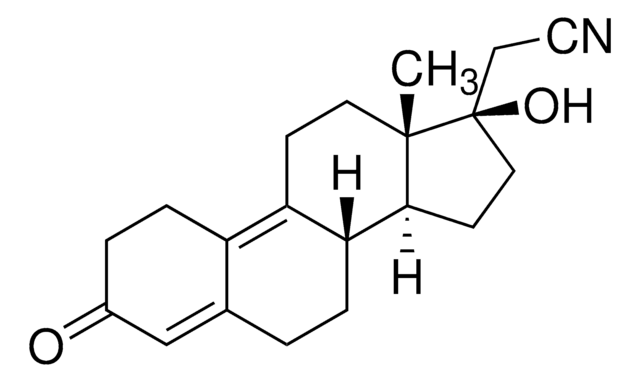Y0000852
Estradiol benzoate for system suitability
European Pharmacopoeia (EP) Reference Standard
Synonym(s):
β-Estradiol 3-benzoate, 1,3,5(10)-Estratriene-3,17β-diol 3-benzoate, 3,17β-Dihydroxy-1,3,5(10)-estratriene 3-benzoate, 3-Benzoyloxy-17β-estrol
About This Item
Recommended Products
grade
pharmaceutical primary standard
API family
estradiol
manufacturer/tradename
EDQM
mp
191-198 °C (lit.)
application(s)
pharmaceutical (small molecule)
format
neat
storage temp.
2-8°C
SMILES string
[H][C@]12CC[C@]3(C)[C@@H](O)CC[C@@]3([H])[C@]1([H])CCc4cc(OC(=O)c5ccccc5)ccc24
InChI
1S/C25H28O3/c1-25-14-13-20-19-10-8-18(28-24(27)16-5-3-2-4-6-16)15-17(19)7-9-21(20)22(25)11-12-23(25)26/h2-6,8,10,15,20-23,26H,7,9,11-14H2,1H3/t20-,21-,22+,23+,25+/m1/s1
InChI key
UYIFTLBWAOGQBI-BZDYCCQFSA-N
Looking for similar products? Visit Product Comparison Guide
General description
Application
Packaging
Other Notes
related product
Signal Word
Danger
Hazard Statements
Precautionary Statements
Hazard Classifications
Carc. 2 - Repr. 1B
Storage Class Code
6.1C - Combustible acute toxic Cat.3 / toxic compounds or compounds which causing chronic effects
WGK
WGK 3
Choose from one of the most recent versions:
Certificates of Analysis (COA)
Sorry, we don't have COAs for this product available online at this time.
If you need assistance, please contact Customer Support.
Already Own This Product?
Find documentation for the products that you have recently purchased in the Document Library.
Our team of scientists has experience in all areas of research including Life Science, Material Science, Chemical Synthesis, Chromatography, Analytical and many others.
Contact Technical Service






